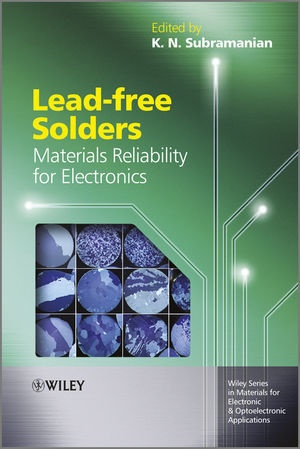Read more
Informationen zum Autor K. N. Subramanian is Professor of Materials Science and Engineering at Michigan State University. He has been a full-time faculty member at MSU for over 45 years. For the last 15 years he has devoted all his research efforts to lead-free electronic solders. Klappentext Providing a viable alternative to lead-based solders is a major research thrust for the electrical and electronics industries - whilst mechanically compliant lead-based solders have been widely used in the electronic interconnects, the risks to human health and to the environment are too great to allow continued widescale usage. Lead-free Solders: Materials Reliability for Electronics chronicles the search for reliable drop-in lead-free alternatives and covers:* Phase diagrams and alloy development* Effect of minor alloying additions* Composite approaches including nanoscale reinforcements* Mechanical issues affecting reliability* Reliability under impact loading* Thermomechanical fatigue* Chemical issues affecting reliability* Whisker growth* Electromigration* ThermomigrationPresenting a comprehensive understanding of the current state of lead-free electronic interconnects research, this book approaches the ongoing research from fundamental, applied and manufacturing perspectives to provide a balanced view of the progress made and the requirements which still have to be met. Zusammenfassung Providing a viable alternative to lead-based solders is a major research thrust for the electrical and electronics industries - whilst mechanically compliant lead-based solders have been widely used in the electronic interconnects, the risks to human health and to the environment are too great to allow continued widescale usage. Inhaltsverzeichnis Series Preface xv Preface xvii List of Contributors xix Thematic Area I: Introduction 1 1 Reliability of Lead-Free Electronic Solder Interconnects: Roles of Material and Service Parameters 3 K. N. Subramanian 1.1 Material Design for Reliable Lead-Free Electronic Solders Joints 3 1.2 Imposed Fields and the Solder Joint Responses that Affect Their Reliability 5 1.3 Mechanical Integrity 5 1.4 Thermomechanical Fatigue (TMF) 6 1.5 Whisker Growth 7 1.6 Electromigration (EM) 7 1.7 Thermomigration (TM) 8 1.8 Other Potential Issues 8 Thematic Area II: Phase Diagrams and Alloying Concepts 11 2 Phase Diagrams and Their Applications in Pb-Free Soldering 13 Sinn-wen Chen, Wojciech Gierlotka, Hsin-jay Wu, and Shih-kang Lin 2.1 Introduction 14 2.2 Phase Diagrams of Pb-Free Solder Systems 14 2.3 Example of Applications 23 2.4 Conclusions 39 3 Phase Diagrams and Alloy Development 45 Alan Dinsdale, Andy Watson, Ales Kroupa, Jan Vrestal, Adela Zemanova, and Pavel Broz 3.1 Introduction 45 3.2 Computational Thermodynamics as a Research Tool 48 3.3 Thermodynamic Databases - the Underlying Basis of the Modelling of Phase Diagrams and Thermodynamic Properties, Databases for Lead-Free Solders 51 3.4 Application of the SOLDERS Database to Alloy Development 57 3.5 Conclusions 68 4 Interaction of Sn-based Solders with Ni(P) Substrates: Phase Equilibria and Thermochemistry 71 Clemens Schmetterer, Rajesh Ganesan, and Herbert Ipser 4.1 Introduction 72 4.2 Binary Phase Equilibria 73 4.3 Ternary Phase Equilibria Ni-P-Sn 85 4.4 Thermochemical Data 94 4.5 Relevance of the Results and Conclusion 111 Thematic Area III: Microalloying to Improve Reliability 119 5 'Effects of Minor Alloying Additions on the Properties and Reliability of Pb-Free Solders and Joints' 121 Sung K. Kang 5.1 Introduction 122 5.2 Controlling Ag3Sn Plate Formatio...

